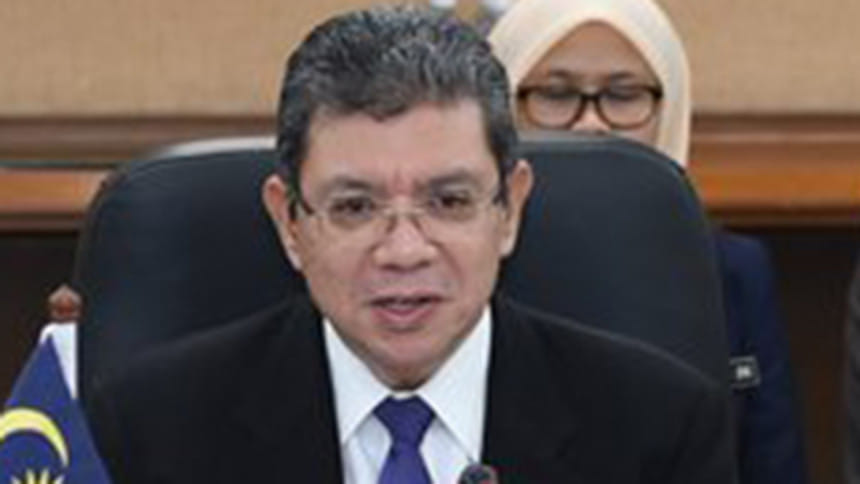Solving Rohingya Crisis: Dhaka wants stronger role of Kuala Lumpur

Bangladesh wants a stronger role of Malaysia, an influential member of the Asean, in addressing the Rohingya crisis as visiting Malaysian Foreign Minister Saifuddin Abdullah holds a meeting with his Bangladeshi counterpart in Dhaka today.
During the meeting, Dhaka would request Kuala Lumpur to reopen its labour market for Bangladeshis, Foreign Minister AK Abdul Momen told The Daily Star yesterday.
Recruitment of Bangladeshi workers remains suspended since September last year following allegations of monopoly and charging high recruitment fees by a syndicate of 10 Bangladeshi recruiting agencies and their lobbies in Kuala Lumpur.
Foreign Minister Momen said, “We have to focus on two crucial issues -- the Rohingya crisis and reopening of Malaysia’s labour market.”
He said he would urge Malaysia, which has been vocal in seeking justice for Rohingyas and their repatriation, to play a stronger role in this regard.
Saifuddin arrived in Dhaka yesterday on a three-day visit, first since assuming office last year. The two foreign ministers will hold the meeting at the State Guesthouse Padma.
The Malaysian foreign ministry in a press statement yesterday said Saifuddin is scheduled to visit a Malaysian field hospital and several Rohingya camps in Cox’s Bazar.
About one million Rohingyas, including around 741,000 who fled to Bangladesh since August 2017 escaping a military crackdown in Myanmar’s Rakhine state, are living in squalid refugee camps in Cox’s Bazar.
Though Myanmar signed a bilateral deal with Bangladesh in November 2017, and a tripartite repatriation deal with the UNDP and UN Refugee Agency in June last year, the repatriation could not be started as Rohingyas say there is no guarantee of safety, citizenship and other basic rights in Rakhine yet.
Meantime, clashes between the Myanmar military and the Arakan Army, an ethnic rebel group, have escalated in Rakhine and Chin states since late last year, creating further worries for the repatriation.
Against such a backdrop, Malaysian Prime Minister Mahathir Mohamad recently proposed formation of an independent international body to monitor repatriation to ensure that Rohingyas are not punished.
Speaking at the 34th Asean Summit in Bangkok on June 23, Mahathir also said the refugees’ opinions must be taken into consideration on the matter of repatriation because they are scared of going back.
Rohingya activist Tun Khin said Malaysia is the “lone champion” on the Rohingya case in the Asean, a regional bloc of Southeast Asian countries.
“Malaysia can play a key role in convincing the other Asean members. It should help take the issue to the International Court of Justice and create conducive conditions in Rakhine for the return of Rohingyas,” the UK-based Rohingya activist told The Daily Star over the phone recently.
Otherwise, the Asean would face trouble in future, he said. “Already, Rohingyas are taking risky sea journeys to Malaysia, Thailand and Indonesia from the camps in Rakhine because they are living in conditions akin to open prisons.”
Tun Khin said Malaysia should take steps to put pressure on Myanmar. If Myanmar does not comply, the Asean should expel it from the bloc, he observed.
The Asean, which maintains the principle of non-interference in internal affairs of its member states, faced criticism for not speaking strong enough for the Rohingyas.
LABOUR MARKET
According to sources at the Bangladesh High Commission in Kuala Lumpur, an estimated eight lakh Bangladeshis are now living in Malaysia.
Rights groups say a large number of the undocumented foreign workers in Malaysia are victims of fraudulence and abuses either by Malaysian employers or companies and their brokers that were in charge of registering the undocumented workers in the previous years. Some of them are also victims of human trafficking.
Bangladesh had requested the Malaysian authorities to give a fresh chance for the undocumented Bangladeshis to get regularised, but they didn’t agree.

 For all latest news, follow The Daily Star's Google News channel.
For all latest news, follow The Daily Star's Google News channel. 








Comments